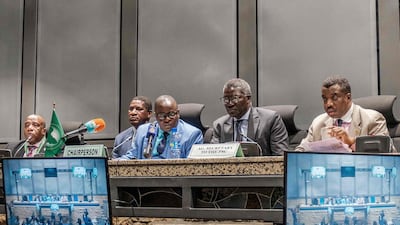The African Union suspended Sudan "with immediate effect" on Thursday, days after a deadly crackdown by security forces on protesters demanding civilian rule.
The pan-African organisation's Peace and Security Council said the suspension would remain in force until Sudan's military rulers handed over power to a transitional, civilian-led administration.
The UAE on Thursday joined Saudi Arabia in calling for a return to the negotiating table by both sides to ensure security and stability for Sudan.
The UAE's Ministry of Foreign Affairs and International Co-operation spoke of "great concern" about developments in Sudan.
"The UAE hopes that wisdom, voice of reason and constructive dialogue would prevail between all Sudanese parties, in a way that guarantees security and stability of Sudan, helps to spare its people the scourge of evil, safeguards its gains and ensures its unity," a ministry statement read.
Sudan's protest leaders have rejected a call by the generals to resume negotiations, saying violence by security forces must stop first and that there must be accountability for this week’s deaths of protesters.
A Sudanese doctors' group has said at least 108 people were killed since Monday and more than 500 were injured.
The Transitional Military Council has assured that investigations into the attacks would be carried out, and that anyone found to have crossed lines would be held to account.
Late on Wednesday, the US State Department urged a return to negotiations. John Bolton, the National Security Adviser, called the violence "abhorrent".
The UN, Britain and Norway condemned this week's violence and urged a return to civilian rule.
About 100 people were killed by security forces during nearly four months of protests against longtime authoritarian ruler Omar Al Bashir before the armed forces removed him from office on April 11 and set up the ruling Transitional Military Council.
Negotiations between the council and protest leaders began later that month, but they foundered over the question of whether a civilian or a general should lead a proposed 11-seat "sovereign council" to act as a collective presidency during a transitional period.
The sit-in protest broken up on Monday was intended to pressure the generals to cede power to civilians.
The African Union suspension means Sudan cannot take part in any meetings or benefit from financial or other AU-linked programmes.
The AU could take further punitive action against Sudan, such as sanctions, and call on the UN to take similar measures.
"The AU Peace and Security Council has with immediate effect suspended the participation of the Republic of Sudan in all AU activities until the effective establishment of a Civilian-led Transitional Authority, as the only way to allow the Sudan to exit from the current crisis," the Union said on Twitter.
Meanwhile, protesters appear determined to maintain pressure on the military.
The Sudanese Professionals Association has instructed supporters on how to run their protests effectively.
Guidelines include overhauling neighbourhood committees, linking them with nearby districts and erecting barricades in residential areas to stop security vehicles.
The group also warned followers against violence, offered tips to avoid injury and urged them to document action by the security forces to be used as evidence against them or their commanders in any future trials.
"Our success hinges on our full commitment to peaceful protests, no matter how hard the criminal militias seek to drag us into violence," the association said on Thursday.
Protest leaders also reported that attacks against demonstrators since Monday took place in 13 cities across the country.
In Khartoum, hundreds of armoured vehicles belonging to the paramilitary Rapid Support Forces patrolled the city, where streets were deserted and most shops closed, AP reported.
Hany Raslan, an Egyptian expert on Sudan at Cairo's Al Ahram Centre for Political and Strategic Studies, said a return to the negotiating table was unlikely to result in protest leaders' demands being met.
"I fear that Sudan is close to slipping into chaos. There is an acute crisis and all scenarios are possible," Mr Raslan told The National.
"They have lost the sit-in, their most potent weapon, and it's too early to determine how effective is the civil disobedience since the country is celebrating the Eid Al Fitr."
Saudi Arabia on Wednesday, said it was watching events in Sudan with great concern, and that stability and security there could only come through negotiations.
Egypt, another regional powerhouse with vital interests in Sudan, has urged restraint.
The UAE and Saudi Arabia between them announced an aid package worth $3 billion (Dh11.01bn) for Sudan soon after Mr Al Bashir's removal.


















